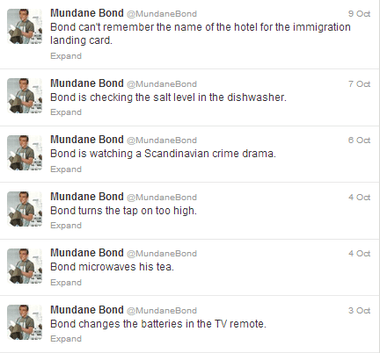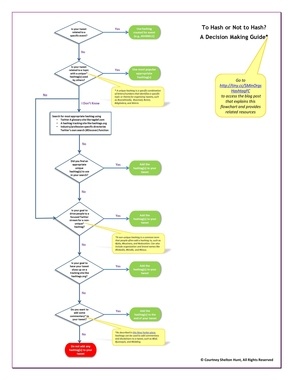The very first hashtag EVER was #barcamp by Chris Messina. Due to this initial successful tryout (against the Twitter boss‘s wishes) we now see hashtags as the first place to find information on the latest news and events on a global scale. Things happen on Twitter through hashtags faster than breaking news programs are able to catch them—the result being that Twitter is now a primary resource for many news stations.
Messina was inspired by Flickr tags to try to get the trend started on Twitter. As a short form of communication, tags/hashtags seemed like a good way of organizing brief exchanges and sharing. And he was right.
From humble beginnings, the hashtag has come to dominate social media platform Twitter. Back in 2009, hashtags were initially talked about as “Twitter groupings”. Four years on, we don’t need that explanation any more.
Hashtag your heart out
The capabilities of hashtags go beyond simple categorising information and discussing events. Hashtags also convey complex emotional responses, context and language styles. As your Twitter profile becomes more and more a part of your personal and professional identity, your choices of hashtags are interpreted by the public as part of your character. This is also true of corporate accounts (and if you weren’t there to see it happen in Twitter, you can now search for hundreds of articles telling you why every company now needs a Pinterest account).
The hashtag is the “smiley” that Twitter doesn’t have. With hastags, you don’t need to scroll through a list to choose the image best representing your emotional state. You can simply invent it on the spot, and combine multiple complex feelings as well as situational context
#MondayMornings #coffee #power
If you’re short on inspiration, you can also choose from a list of trending or common hashtags. It’s also a pretty efficient way of keeping up with new abbreviations and trending invented words. This all matters a hell of a lot if you work in marketing.
#TGIF
Hashtag hot gossip
The hashtag is a quick route to get a discussion going with anyone in the world on a topic. It is an open and free environment in 140 characters. It can also open the door to Twitter wars: many people have sat on the sidelines watching in glee as Miley Cyrus and Sinead O’Connor sparred over women’s roles in the entertainment (there it is: I finally mentioned Miley Cyrus in an article). Although deep down we suspect that all the big Twitter accounts are run by a few PR professionals, it’s still kind of exciting to think we may be directly communicating with names that we would otherwise have absolutely no way of connecting with at all.
#LouisCK #inappropriate #gottaloveit
Reminder: do not to believe a lot of what goes around on Twitter before proper news reporting has actually been done on it. And beware of fake accounts. But do watch a few parody accounts—they can be golden (e.g. Mundane Bond).
Hashtag group hug
Community in a fast-moving tech universe is an addiction. This is obvious from people’s need to share and connect on the many social media platforms available to them. Twitter is often quoted as the most narcissist-encouraging of these platforms.
#badhair #ugly #hugme #tears
Whilst it is a method of reaching out to the people, it’s also an invitation for trolls to magnify your plight with sarcasm and often plain cruelty.
Hashtag lead balloons
1) Hashtag integration with G+ (auto-generated)
2) Facebook (not taking off so fast)
Despite the hashtag culture on Twitter, it has not spread to Facebook and Google+ in the same manner. G+ took the approach of integrating hashtags (i.e. when you post, G+ adds a hashtag on the top right automatically, so your post is categorised for you). Facebook, like Twitter, allows you to attach the hashtag yourself. Perhaps what’s going wrong with Facebook is that it was established without hashtags in the early days. There’s also the issue that if you put a hashtag on your post, it becomes publicly visible to anyone clicking on that hashtag. Facebook is highly personal. Twitter is public and about quickfire info sharing. What is Google+? Perhaps until it develops a clear identity the hashtag will remain an ambiguous character.
Hashtag house rules:
If you want your hashtagged information to be popular rather than spammy, this flowchart explicitly tells you how to do it.
I <3 hashtags
Hashtags bring out the ordinary in the most seemingly unreachable of people. There is some comfort to be had knowing that The Rock is having a caramel frappucino and damn, is it tasty this morning #winning (note: that was 100% invented by me).
Here’s an example of “how not to” and “how to” hashtag:
Hashtags are loved because of how easy they are to apply (for users), and how funny it can be to read the messages of those who have gotten it completely wrong (for the observers). The famous YouTube sketch with Justin Timberlake and Jimmy Fallon says it all.
Using #hashtags makes you #cool.
Complaining about #hashtags makes you #cool.
It’s a win/win!
















































